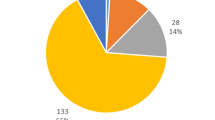Abstract
Adherence to the treatment of diabetic patients is always a challenge. Hence the study was carried out to find out the effectiveness of the diabetic clinic, in improving the adherence of patients. Study subjects: Patients with known DM attending Diabetic clinic of Medical College Hospital, Sangli. Study design: Cross Sectional study. Study duration: 6 months. Study Tools: Pre tested proforma with written consent of the DM patient. Sampling techniques: all the patients attending diabetic clinic were interviewed once. Sample size: 282. Adherence to pharmacological treatment was 93.3 %, while adherence to non pharmacological treatment, was 78.3 % and 95 % respectively. Statistically highly significant difference was found for the adherence to advice like reducing sugar consumption, in rural and urban patients. Similarly the observed difference was found to be highly significant for the adherence to advice like carrying out daily exercise compared between male and female. Unaffordable drug price was one of the main causes of non-adherence. Adherence to treatment of diabetic patients can be improved with effective and efficient diabetic clinic.

Similar content being viewed by others
References
King H, Aubert R, Herman W. Global burden of diabetes, 1995–2025: prevalence, numerical estimates and projections. Diabetes Care. 1998;21:1414–31.
Kounteya Sinha, TNN, Dec 14, 2011. The Times of India.
Feinstein AR. On white-coat effects and the electronic monitoring of compliance. Arch Intern Med. 1990;150:1377–78.
Cramer JA. A systematic review of adherence with medications for diabetes. Diabetes Care. 2004;27:1218–24.
Mason BJ, Matsuyama JR, Jue SG. Assessment of sulfonylurea adherence and metabolic control. Diabetes Educator. 1995;21:52–7.
Martinez YV, Carlos A Prado-Aguilar, Ramon A Rascon-Pacheco and Jose J Valdivia-Martinez. Quality of life associated with treatment adherence in patients with type 2 diabetes: a cross-sectional study. BMC Health Services Research 2008;8:164
Shobhana R, Begum R, Snehalata C, Vijay V, Ramchandran A. Patients’ adherence to diabetes treatment. J Assoc Physicians India. 1999;47:1173–5.
Cox DJ, Gonder-Frederick L. Major developments in behavioral diabetes research. J Consult Clin Psychol. 1992;60:628–38.
Diabetes Control and Complications Trial Research Group. The effect of intensive treatment of diabetes on the development and progression of long-term complications in insulin-dependent diabetes mellitus. N Engl J Med. 1993;329:977–86.
Wabe NT, Angamo MT, Hussein S. Medication adherence in diabetes mellitus and self management practices among type-2 diabetics in Ethiopia. N Am J Med Sci. 2011;3:418–23.
Yusuf KB, ObeO, Joseph BY, Adherence to anti-diabetic therapy and self management practices among type-2 diabetics in Nigeria. PHARMACY WORLD & SCIENCE. 30:876–83.
Kapur A, Bjork S, Nair J, Kelkar S, Ambady R. Socio-economic determinants of the cost of diabetes in India. Diabetes voice. 2004;49:18–21.
Goldman D, Joyce GF, Escarce JJ. Pharmacy benefits and the use of drugs by the chronically ill. JAMA. 2004;291:2344–50.
Martin BC, McMillan JA. The impact of implementing a more restrictive prescription limit on Medicaid recipients: effects on cost, therapy, and out-of-pocket expenditures. Medical Care 1996;34:686–701.(cross ref)
Piette JD, Heisler M, Horne R. A conceptually-based approach to understanding chronically-ill patients' responses to medication cost pressures. Social Science and Medicine 2006;62:846–57.(cross ref.)
Mohamed EE. Shams, Mohammed M.H. A1-Gayyar and Enaase A.M.E. Barakat, Type 2 Diabetes Mellitus-Induced Hyperglycemia in Patients with NAFLD and Normal LFTs: relationship to Lipid Profile, Oxidative stress and Pro-Inflammatory Cytokines. Sci Pharm. 2011;79:623–34.
Ciechanowski PS, Katon WJ, Russo JE, Walker EA. The patient-provider relationship: attachment theory and adherence to treatment in diabetes. Am J Psychiatry. 2001;158:29–35.
DCCT Research Group. Influence of intensive diabetes treatment on quality of life outcomes in the diabetes control and complications trial. Diabetes Care. 1996;19:195–203.
UK Prospective Diabetes Study (UKPDS) Group. Intensive blood-glucose control with sulfonylureas or insulin compared with conventional treatment and risk of complications in patients with type 2 diabetes (UKPDS 33). Lancet. 1998;352:837–53.
Bathgate M, Alexander D, Mitikulena A. The health of Pacific Islands people in New Zealand. Wellington: Public Health Commission; 1994.
Allen FM, Stillman E, Fitz R: Total dietary regulation in the treatment of diabetes. In Exercise. New York, Rockefeller Inst., 1919, chapt. 5, monogr. 11
Horton ES. Role and management of exercise in diabetes melitus. DIABETES CARE. 1988;11:201–11.
Max W. Simmons, Factors affecting exercise adherence in non-insulin dependent diabetes mellitus sufferers; a thesis submitted to the dept. of psychology, the University of Adelaide, for degree of M.A. Dec. 1989.
Schoenfeld ER, Judith MG, Wu SY, Leske MC. Patterns of adherence to diabetes vision care guidelines; baseline findings from the diabetic retinopathy awareness program. Opthalmology. 2001;108:563–71.
Osterberg L, Blaschke T. Adherence to medication. N Engl J Med. 2005;353:487–97.
Adherence to long term therapies: evidence for action. Geneva, World Health Organization, 2003. (cross ref)
DiMatteo MR. Variations in patient’s adherence to medical recommendations: a quantitative review of 50 years of research. Med Care. 2004;42:200–9.
Lacro JP, Dunn LB, Dolder CR. Prevalence of and risk factors for medication nonadherence in patients with schizophrenia: a comprehensive review of recent literature. Journal of Clinical Psychiatry 2002;63:892–909.(cross ref)
Johnson SB. Methodological issues in diabetes research, measuring adherence. Diabetes Care. 1992;15:1658–67.
Author information
Authors and Affiliations
Corresponding author
Rights and permissions
About this article
Cite this article
Gore, A.D., Dhumale, G.B., Kumbhar, U.T. et al. Treatment Adherence of Diabetic Patients Attending Diabetic Clinic. Int J Diabetes Dev Ctries 35, 19–25 (2015). https://doi.org/10.1007/s13410-014-0213-z
Received:
Accepted:
Published:
Issue Date:
DOI: https://doi.org/10.1007/s13410-014-0213-z



